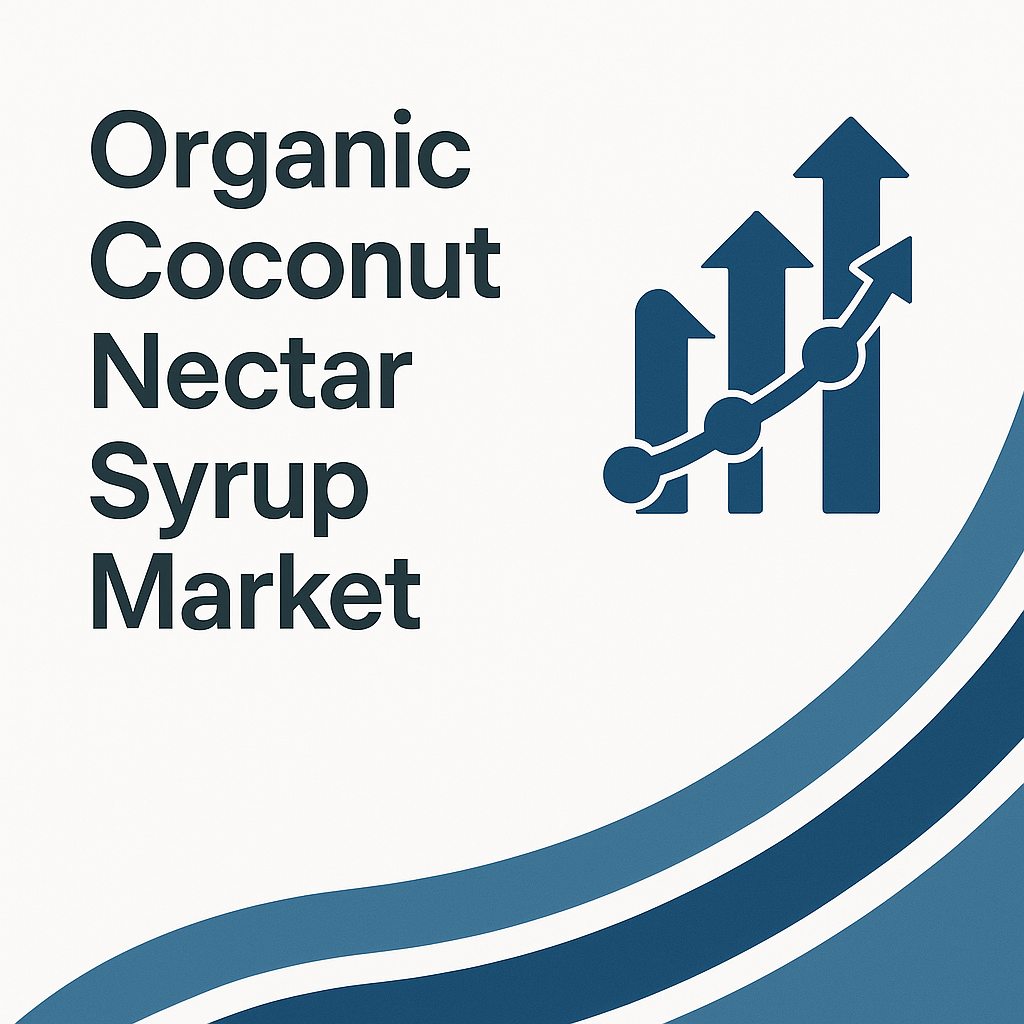Organic Coconut Nectar Syrup Market Revenue was valued at USD 120 Million in 2026 and is estimated to reach USD 250 Million by 2033, growing at a CAGR of 9.1% from 2026 to 2033.
Organic Coconut Nectar Syrup Market Overview
The Organic Coconut Nectar Syrup market is witnessing a steady expansion driven by the rising global demand for natural and alternative sweeteners. As of 2025, the market is valued at approximately USD 310 million and is expected to grow at a compound annual growth rate (CAGR) of 7.5% over the forecast period from 2026 to 2033. This growth trajectory is largely fueled by shifting consumer preferences toward low-glycemic, nutrient-dense, and plant-based products. Increasing awareness about the health risks associated with refined sugar has significantly boosted the demand for naturally derived sweeteners such as coconut nectar syrup, particularly in the organic segment.
One of the key drivers of this market is the growing vegan and gluten-free food trends. Organic coconut nectar syrup fits seamlessly into the health-conscious and clean-label movement, offering a non-GMO, low-fructose, and sustainably sourced sugar alternative. The syrup is widely utilized in a variety of applications, including bakery products, beverages, dressings, and nutritional bars, adding to its versatility and wide appeal. Furthermore, consumer demand for minimally processed and ethically produced food items is encouraging producers to invest in organic certification, sustainable farming techniques, and transparent supply chains.
Another factor contributing to the market’s momentum is the rise of functional foods and natural ingredients in sports nutrition and diabetic-friendly products. Organic coconut nectar syrup, with its rich profile of amino acids, minerals, and a lower glycemic index, is increasingly being marketed as a functional food ingredient. Additionally, the growth of the food and beverage industry in emerging economies, especially across Asia-Pacific and Latin America, is creating lucrative expansion opportunities for producers and suppliers.
From a regional standpoint, Asia-Pacific leads the market due to abundant coconut production, traditional knowledge of coconut-based products, and rising health consciousness among consumers. However, North America and Europe are witnessing the fastest growth rates, driven by clean-eating trends, increased organic food spending, and expanding online retail platforms.
Despite promising growth, the market faces challenges such as limited consumer awareness in developing regions, higher cost compared to conventional sweeteners, and climatic risks affecting coconut yields. However, advances in agricultural practices, cold-chain logistics, and growing organic farming subsidies are expected to mitigate these concerns and unlock new growth frontiers for the industry.
Organic Coconut Nectar Syrup Market Segmentation
1. By Product Type
-
Raw Organic Coconut Nectar Syrup
-
Concentrated Organic Coconut Nectar Syrup
The market can be segmented based on the form in which the syrup is offered. Raw organic coconut nectar syrup is gaining traction among health-conscious consumers who prioritize minimally processed food items. This type retains more of its natural nutrients and enzymes, making it popular among users who prefer clean-label and unrefined products. It is primarily used in artisanal food manufacturing and homemade recipes.
On the other hand, concentrated organic coconut nectar syrup is preferred in commercial settings where higher sugar concentration and longer shelf life are desirable. This subsegment has greater utility in mass food processing, ready-to-drink beverages, and confectionery production. Its stability and uniform sweetness profile make it suitable for standardized recipes in large-scale operations. As consumer demand for natural sweeteners increases, both subsegments are poised to grow, though the raw form is likely to dominate among premium and niche product categories.
2. By Application
-
Bakery & Confectionery
-
Beverages
-
Dairy Alternatives & Vegan Foods
-
Nutraceuticals & Functional Foods
The application-based segmentation reveals the diverse utility of organic coconut nectar syrup. The bakery and confectionery segment leads the market owing to rising demand for healthier sweetening options in cakes, muffins, chocolates, and cookies. Organic coconut nectar syrup imparts a subtle caramel flavor and a moist texture, making it ideal for natural baked goods.
In the beverage segment, the syrup is used in energy drinks, smoothies, tea blends, and flavored waters. The low glycemic index and mineral-rich profile appeal to fitness enthusiasts and health-conscious consumers, especially those looking for sugar substitutes in hydration and pre-workout drinks.
Dairy alternatives and vegan food producers are increasingly incorporating this syrup into their product lines, including yogurt alternatives, non-dairy ice creams, and plant-based cheese spreads. It enhances flavor while maintaining compliance with vegan and lactose-free claims. Meanwhile, the nutraceutical and functional foods segment is expanding due to the syrup’s amino acid content and its role as a natural energy booster, especially in protein bars and dietary supplements.
3. By Distribution Channel
-
Supermarkets/Hypermarkets
-
Health Food Stores
-
Online Retail
-
Foodservice & Industrial
The market distribution is evolving with changing consumer shopping preferences. Supermarkets and hypermarkets still account for a significant portion of retail sales due to their wide presence, organized layout, and consumer trust. These outlets often showcase organic and natural product sections, helping boost visibility and sales of organic coconut nectar syrup.
Health food stores are gaining popularity among niche and premium consumer segments. These stores typically offer curated organic, vegan, and gluten-free options, making them a preferred destination for coconut nectar syrup buyers. They also provide opportunities for direct customer education and product sampling.
Online retail is emerging as a high-growth distribution channel, especially post-pandemic. Consumers value the convenience, broader product choices, and subscription-based models offered by e-commerce platforms. With enhanced digital marketing and influencer-led awareness campaigns, online platforms are effectively expanding the market’s reach, especially in non-urban areas.
In the foodservice and industrial segment, bulk purchasing for restaurants, cafes, and large-scale food manufacturers is witnessing growth. Organic coconut nectar syrup is being increasingly adopted by food innovators and chefs for its distinctive flavor and healthy image, aligning with the rising trend of organic menus and clean-label foodservice.
4. By Geography
-
Asia Pacific
-
North America
-
Europe
-
Rest of the World (Latin America, Middle East & Africa)
Geographical segmentation highlights the regional disparities and growth patterns in this market. The Asia Pacific region, especially Southeast Asian countries, dominates the supply and consumption of organic coconut nectar syrup due to traditional use, favorable climate for coconut farming, and lower production costs. This region also serves as a major exporter to global markets.
North America is a rapidly growing market, propelled by a strong organic food industry, increasing consumer inclination toward non-refined sweeteners, and rising demand for plant-based diets. The United States, in particular, has witnessed a surge in specialty food sales featuring coconut-based ingredients.
Europe is also seeing notable growth, with countries like Germany, the UK, and France embracing organic and sustainable food trends. European consumers are highly responsive to ethical sourcing and eco-friendly packaging, making this a favorable market for certified organic syrup producers.
In the Rest of the World, Latin America is emerging as a potential growth hub due to expanding organic farming infrastructure, while the Middle East and Africa are gradually adopting alternative sweeteners as awareness and health consciousness improve. Regional trade agreements and increased cross-border e-commerce are further catalyzing demand in these emerging territories.

